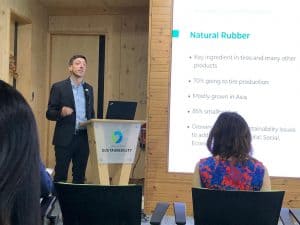Through a process led by the Policy Toolbox and Implementation Guidance Working Group (WG1), the General Assembly approved a Policy Framework in September 2020. The Framework outlines specific commitments to sustainable natural rubber that GPSNR company members must include in their public policies or other relevant documents.
The next step is for GPSNR to develop the Implementation Guidance and Reporting Requirements as they pertain to the specific commitments laid out in the GPSNR Policy Framework. WG1 is engaging consultant(s) to develop the Implementation Guidance and Reporting Requirements. As the Implementation Guidance and Reporting Requirements will vary depending on where a member company sits within the natural rubber supply chain, input will be needed to develop these documents for the following stakeholder categories: natural rubber producers/processors and traders, tire makers and other natural rubber product manufacturers, and auto makers and other end users.
GPSNR is creating focus groups for each of the three stakeholder categories to enable broader participation of members from each stakeholder group. Members from other stakeholder groups are also encouraged to join the focus groups to help ensure a balanced dialogue.
Focus groups will work closely with the consultant(s) to ensure that the Implementation Guidance and Reporting Requirements are relevant to the respective stakeholder categories. Once these documents are finalized, they will be voted on at the next General Assembly.
GPSNR is now looking for volunteers to join the stakeholder category focus groups that will be consulted during the development of GPSNR’s Implementation Guidance. There are no limits to how many category members can join the focus groups. Members are encouraged to join at least one focus group.
The entire process is expected to conclude by June 2021.





